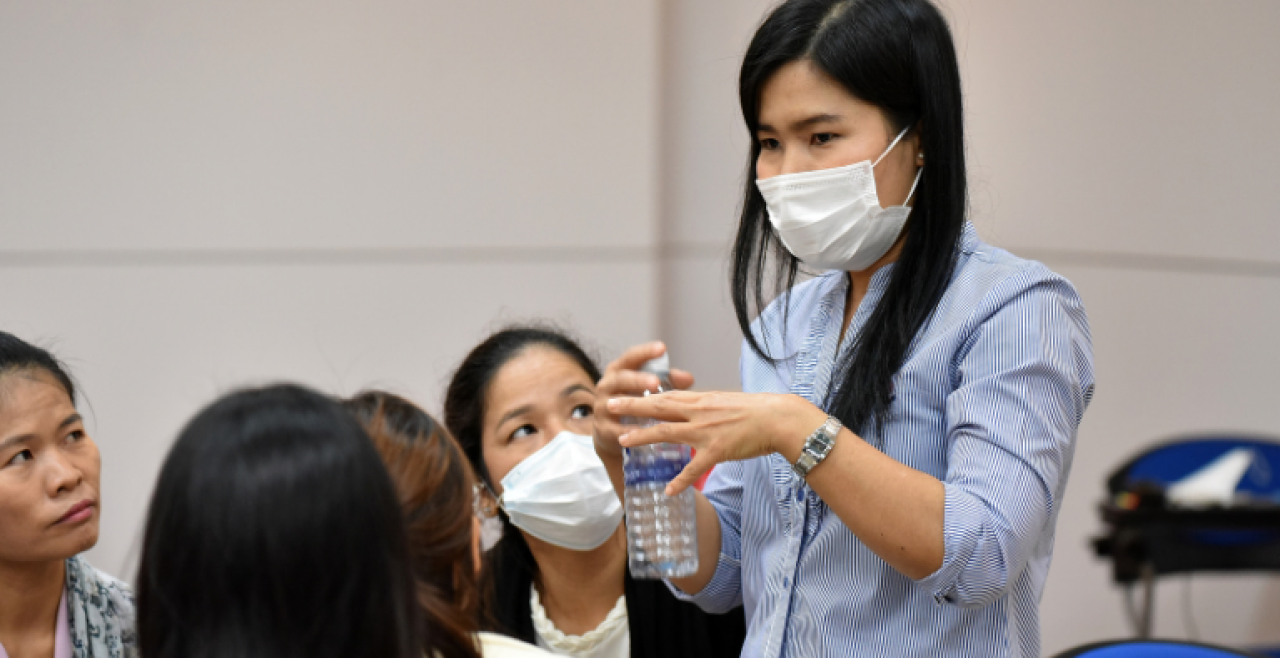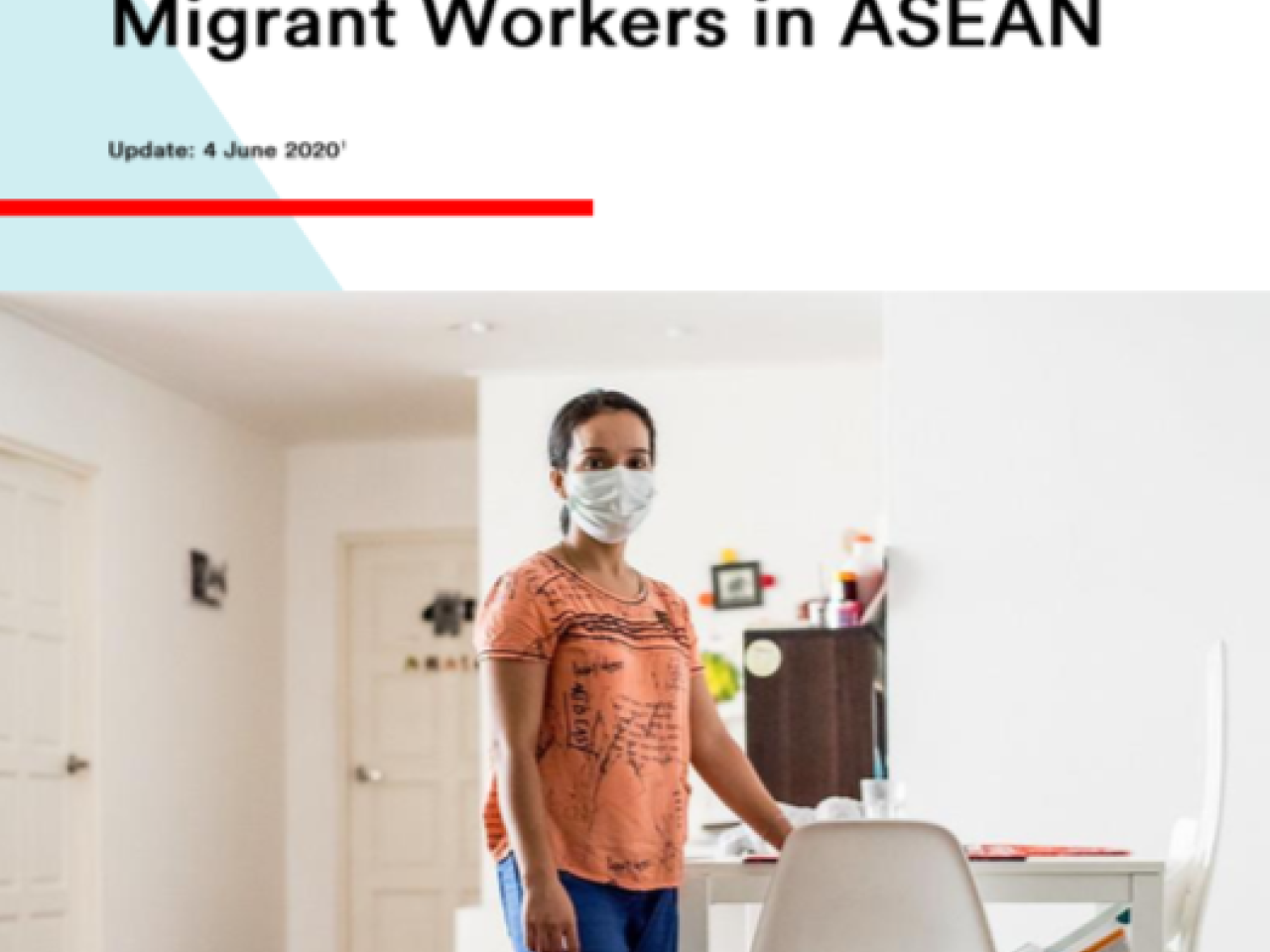Empowering Myanmar domestic workers in Thailand

Women have been hit harder by the economic impacts of the coronavirus pandemic as more women work in low-paying, insecure and informal jobs. This includes migrant domestic workers. Nan Zar Ni Myint is a domestic worker from Myanmar and a volunteer in her community based in Bangkok, Thailand. She has mobilized her network of domestic workers to support other domestic workers in Thailand, especially during the COVID-19 pandemic.
BANGKOK, Thailand - “I believe that all women migrant domestic workers should be able to exercise their rights,” says Nan Zar Ni Myint. “Unfortunately, not everyone knows their rights.”
Ms. Myint, a 37-year-old woman from Myanmar, has been working as a domestic worker in Thailand for 19 years. Four years ago, while taking an English course on Sundays – her only day off work – she met a group of domestic workers from her home country.
“The peer network and language skills I gained enabled me to access more information,” she says. “I started to learn about the rights of migrant domestic workers.”
As she interacted more with the group, she learned that the rights of many migrant domestic workers were violated, and some of her peers experienced abuse and violence. “Many domestic workers were working long hours, seven days a week,” says Ms. Myint. “Some had their travel and personal identification documents withheld by their employers. With the COVID-19 pandemic, some have even experienced gender-based violence while confined at home during lockdowns.”
“One of them said I was lucky to have a standard working contract. But that is not luck; it is my right.”
Ms. Myint now volunteers to help other migrant domestic workers from Myanmar learn about their rights and services available to support them when their rights are violated.
“I started to organize meetings and discussions informally to provide information about labour laws in Thailand, conditions of employment, minimum wage, working hours, leave days, rights to keep one’s own legal documents, and termination rules for domestic workers. I believe that it is very important to empower migrant domestic workers, and that we share knowledge and experience,” says Ms. Myint.
“I believe that all women migrant domestic workers should be able to exercise their rights. Unfortunately, not everyone knows their rights.” - Nan Zar Ni Myint, activist
Providing critical support for violence survivors
“Before the COVID-19 outbreak, I could meet with my network and visit peers who needed support. Now the pandemic has affected the way I work. Many domestic workers are working in confinement. I could not travel and most of the activities are conducted online. We had to keep in touch through social media. It’s hard but I’m not giving up.”
Ms. Myint and her network are often the first point of contact for migrant domestic workers experiencing violence. They provide critical services, such as peer-support counselling, referral to services and economic support, as well as language interpretation.
Three months ago, one migrant worker reached out to the network when her employer physically abused her. She had been threatened to keep quiet, and was scared because she could not afford to lose her job during the pandemic.
Ms. Myint noticed her swollen face and bruises when they met. Within days, she was able to raise funds through the network to support the survivor and connect her with medical and legal services. The survivor received compensation for the abuse, and with Ms. Myint’s help, now has a new employer, under a standard contract.
"The pandemic has affected the way I work... It’s hard but I’m not giving up.” - Nan Zar Ni Myint
Calling for equal rights for all
In Thailand, like other countries in the Asia-Pacific region, domestic workers have long been an important part of many families. Thailand is the main destination for migrant domestic workers from Myanmar. However, full protection under the current labour laws, such as minimum wage, maternity leave and social security benefits, do not apply to domestic workers in Thailand.
Lack of social protections has had deep repercussions for domestic workers across the region during the COVID-19 pandemic, as they often lost jobs and had no safety nets to fall back on. According to ILO’s study on “Impact of the COVID-19 crisis on loss of jobs and hours among domestic workers”, in Asia and the Pacific, 72.3 per cent of domestic workers were significantly impacted by June 2020, out of which 49 per cent were women.
As a member of HomeNet Thailand, an organization that supports home-based workers, Ms. Myint also advocates for revision of the regulations to provide better protection for migrant domestic workers. Her message to the authorities is clear: “ensure the labour laws apply fully to migrant domestic workers, invite the employers to respect their rights and establish a standard contract that complies with the law.”
Ms. Myint, her network and HomeNet are supported by the joint ILO-UN Women Safe and Fair Programme, under the EU-UN Spotlight Initiative, which is working to support migrant domestic workers in Thailand and across the Association of Southeast Asian Nations (ASEAN) region through peer networks. From 2018 to 2020, Safe and Fair supported 3,210 women migrant workers to organize into workers’ unions, associations and peer networks, and facilitated the formation of one new migrant domestic workers’ network. Within the same period, 54,436 women migrant workers have received information on safe and fair migration by peer networks supported by the programme.
By Pichit Phromkade with reporting from Kohnwilai Teppunkoonngam. Article first published on the UN Women website.


